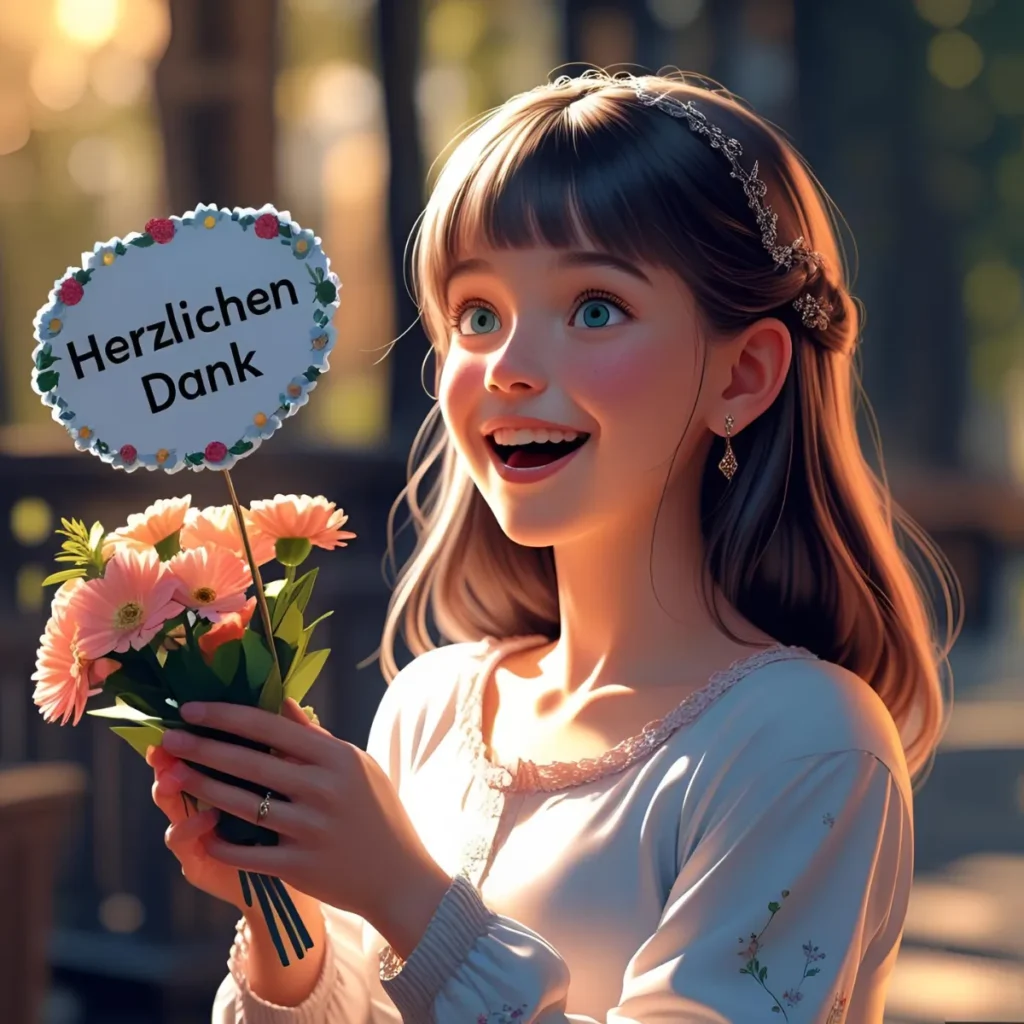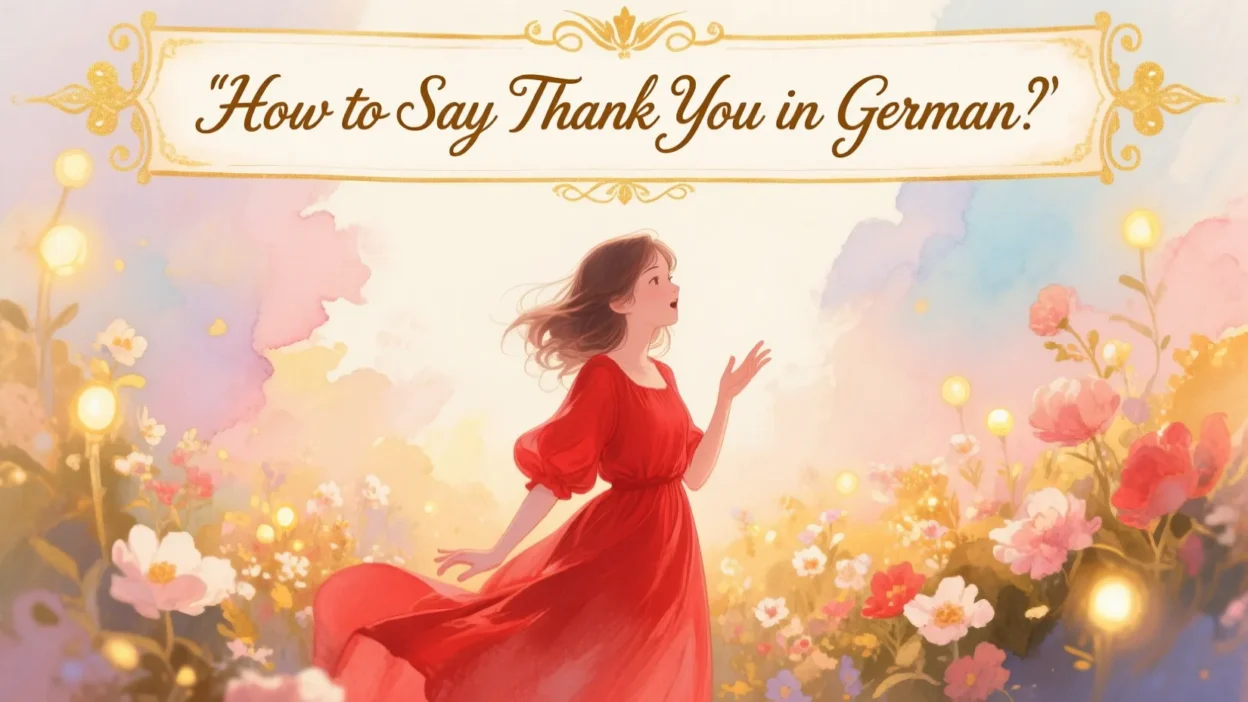Learning how to say thank you in German is one of the first steps to speaking politely and confidently. The most common word is “Danke” (pronounced DAHN-keh), which is simple, friendly, and used in almost every situation.
Saying thank you in German shows respect and appreciation, whether you’re talking to friends, strangers, or in formal settings. Knowing a few variations can help you sound natural, polite, and thoughtful in daily conversations.
Other phrases like “Vielen Dank” (Many thanks) or “Danke schön” (Thank you kindly) make your gratitude stronger and more heartfelt. Using these phrases correctly can make a big difference in how friendly and polite you seem in German.
Say Thank You in German
Here’s your 15 ways to say Thank You in German in a clear table format with pronunciation, meaning, and context:
15 phrases table for How to Say Thank You in German
| German Phrase | Pronunciation | Meaning | Context |
|---|---|---|---|
| Danke | DAHN-kuh | Thank you | Common, informal |
| Vielen Dank | FEE-len dahnk | Many thanks | Polite, formal/informal |
| Herzlichen Dank | HERTS-lih-chen dahnk | Heartfelt thanks | Formal, warm tone |
| Tausend Dank | TOW-zent dahnk | A thousand thanks | Informal, enthusiastic |
| Dankeschön | DAHN-kuh-shurn | Thank you very much | Friendly, informal |
| Besten Dank | BEHS-ten dahnk | Best thanks | Polite, formal |
| Danke sehr | DAHN-kuh zair | Thank you very much | Polite emphasis |
| Vielen herzlichen Dank | FEE-len HERTS-lih-chen dahnk | Many heartfelt thanks | Warm, formal |
| Ich danke dir | ICH DAHN-kuh deer | I thank you | Informal, personal |
| Ich danke Ihnen | ICH DAHN-kuh EEN-en | I thank you | Formal |
| Danke vielmals | DAHN-kuh feel-mahls | Thanks a lot | Informal or polite |
| Großen Dank | GROW-sen dahnk | Great thanks | Formal, appreciative |
| Besten Dank im Voraus | BEHS-ten dahnk im fohr-owss | Thanks in advance | Formal, before receiving help |
| Vergelt’s Gott | Fer-GELTS got | May God reward you | Southern Germany/Austria, religious |
| Danke dir vielmals | DAHN-kuh deer feel-mahls | Thanks to you very much | Friendly, informal |
1. Danke
Meaning: Thank you
Origin: From Old High German dankōn, meaning “to think” — originally expressing thoughtful recognition.
Example:
👤 User A: Hier ist dein Kaffee.
👤 User B: Danke!
Use: Most common and versatile. Suitable in almost any situation.
2. Danke schön

Meaning: Thank you kindly / Thank you very much
Origin: “Schön” means “beautiful” or “nicely,” so this adds a warm emphasis.
Example:
👤 User A: Ich habe das Buch für dich besorgt.
👤 User B: Oh, danke schön!
Use: Polite and slightly more formal than just “Danke.”
3. Vielen Dank
Meaning: Many thanks
Origin: Literally “many thanks” — a direct and clear way to express deep gratitude.
Example:
👤 User A: Ich habe deinen Bericht gelesen. Sehr gut gemacht!
👤 User B: Vielen Dank! Ich habe mir Mühe gegeben.
Use: Professional or personal; formal and sincere.
4. Herzlichen Dank

Meaning: Heartfelt thanks
Origin: From “Herz” (heart), showing warm or emotional appreciation.
Example:
👤 User A: Ich habe dir einen Platz reserviert.
👤 User B: Herzlichen Dank, das bedeutet mir viel.
Use: Formal or emotional situations—thank you cards, speeches.
5. Tausend Dank
Meaning: A thousand thanks
Origin: A poetic exaggeration for emphasis—like “Thanks a million!”
Example:
👤 User A: Ich hab deine Katze gefüttert.
👤 User B: Tausend Dank! Ich war so besorgt.
Use: Informal, expressive, and enthusiastic.
6. Ich danke dir

Meaning: I thank you (informal)
Origin: Personal form with “dir” (you, informal).
Example:
👤 User A: Ich habe dir beim Umzug geholfen.
👤 User B: Ich danke dir. Ohne dich hätte ich es nicht geschafft.
Use: Friendly and personal, slightly more serious than just “Danke.”
7. Ich danke Ihnen
Meaning: I thank you (formal)
Origin: “Ihnen” is the formal “you.” Shows respect in professional or official settings.
Example:
👤 User A: Hier sind Ihre Unterlagen.
👤 User B: Ich danke Ihnen sehr.
Use: Formal; great for business, elders, or strangers.
8. Danke dir
Meaning: Thanks to you (informal short form)
Origin: Contraction of “Ich danke dir.”
Example:
👤 User A: Ich habe das Licht ausgemacht.
👤 User B: Danke dir! Ich hab’s vergessen.
Use: Very casual and friendly.
9. Danke vielmals
Meaning: Thanks a lot / Many thanks
Origin: “Vielmals” = “many times.” Used for emphasizing frequency or effort.
Example:
👤 User A: Ich habe deine Nachricht weitergeleitet.
👤 User B: Danke vielmals! Das war wichtig.
Use: Emphatic and polite; often used in emails or formal speech.
10. Ich bin dir sehr dankbar
Meaning: I am very grateful to you
Origin: “Dankbar” means grateful — used for deeper appreciation.
Example:
👤 User A: Ich habe mit deinem Professor gesprochen.
👤 User B: Ich bin dir sehr dankbar!
Use: Strong gratitude, used in more emotional or serious moments.
11. Ich bin Ihnen dankbar
Meaning: I am grateful to you (formal)
Origin: Formal version of the above; used with “Ihnen.”
Example:
👤 User A: Wir haben Ihren Antrag genehmigt.
👤 User B: Ich bin Ihnen wirklich dankbar.
Use: Formal, respectful, and professional.
12. Danke nochmals
Meaning: Thanks again
Origin: “Nochmals” = “once again.” A follow-up thank-you.
Example:
👤 User A: Ich hab dir gestern geholfen, erinnerst du dich?
👤 User B: Natürlich – danke nochmals!
Use: Polite repetition or follow-up gratitude.
13. Danke, gleichfalls
Meaning: Thanks, same to you
Origin: “Gleichfalls” = likewise. Often a reply to a well-wish.
Example:
👤 User A: Schönes Wochenende!
👤 User B: Danke, gleichfalls!
Use: Common in exchanges of good wishes.
14. Besten Dank
Meaning: Best thanks
Origin: Slightly more formal, commonly used in writing (emails, letters).
Example:
👤 User A: Ich sende dir die Datei später.
👤 User B: Besten Dank!
Use: Polite and business-appropriate.
15. Ich weiß das zu schätzen
Meaning: I appreciate that
Origin: Literally “I know how to value that.” Used for sincere appreciation.
Example:
👤 User A: Ich habe extra gewartet, bis du fertig warst.
👤 User B: Ich weiß das wirklich zu schätzen.
Use: Sincere, meaningful, often emotional.
FAQs
- What is the basic way to say thank you in German?
The most common word is “Danke” (DAHN-keh). - Is “Danke” formal or informal?
It’s neutral, used in both casual and polite situations. - How do you say “Thank you very much” in German?
Say “Vielen Dank” (FEE-len dahnk). - What is a polite way to say thank you in German?
Use “Danke schön” (DAHN-keh shurn) or “Vielen Dank”. - Can I just say “Danke” in text messages?
Yes, it’s simple and widely understood in writing too. - How do you respond when someone says thank you?
You can say “Bitte” (BIT-teh), which means You’re welcome. - Is “Danke sehr” different from “Danke schön”?
Both are polite ways to say thank you; Danke sehr is slightly more formal. - Can I use “Danke” with strangers?
Yes, it’s polite enough for strangers, shopkeepers, or colleagues. - How do you say “Thanks a lot” casually?
Say “Danke vielmals” (DAHN-keh feel-mahls). - Why is saying thank you important in German culture?
Germans value politeness and respect, so saying thank you is essential in daily life.
Conclusion:
Saying thank you in German goes far beyond a simple “Danke.” Depending on who you’re speaking to and the tone of the situation, choosing the right expression can leave a strong impression. Whether you’re sending an email, thanking a friend, or showing heartfelt gratitude, these 15 phrases will help you connect more meaningfully with German speakers.

Sophia Mitchell is a passionate content writer known for creating clear, engaging, and informative articles.
She focuses on delivering well-structured content that is easy for readers to understand and trust.
Sophia Mitchell currently contributes quality writing to repliesnest.com, helping readers find accurate answers quickly.



